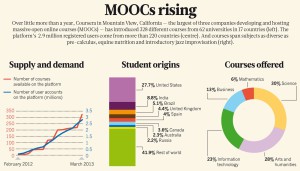The Initial Knowledge State of College Physics Students, a 1985 paper by physics professors Ibrahim Abou and David Hestenes, stated that the “talk-and-chalk” method of teaching often educates students in incremental ways. In fact, further research by physicist Richard Hake revealed that an interactive experience between students often fared better in terms of attention span than a teacher at the podium. Online classes, that promote group assignments via chat, videoconferencing and emails make the classroom mobile, more accessible, and therefore, without borders.
As discussed in an earlier blog, MOOCs have grown up and become a largely favored educational alternative to conventional instruction. Already, the numbers are impressive: 500 colleges and 200 organizations offer online courses — with an estimated 30 million students.

The academic integrity of online education works because it addresses aspects of traditional instruction that do not fully capitalize on the way students effectively learn. Online instruction via videos allow students to learn applying the brain’s innate métier: focusing, replaying, considering, learning. This is particularly true in more technical courses, where difficult chapters can be replayed to a specifically difficult portion of a lecture. With an online college experience, students receive an education that fosters complex thinking and subject retention. According to Barbara Oakley, “[…] online courses can hold students’ attentions, at times better than teachers in person can.”
Scott Freeman et al’s Proceedings of the National Academy of Sciences report revealed that the fluid and uninterrupted process of tutoring created improvements in learning. Since the birth of the internet some 26 years ago, distance learning techniques have proven to challenge traditional instruction. The flexibility of lectures via online lesson plans offer not just students the ability to make learning mobile, it can rejuvenate educators to create lesson plans with a greater marked purpose.
Photo credits
Online Learning
Research contribution
A. Anderson


